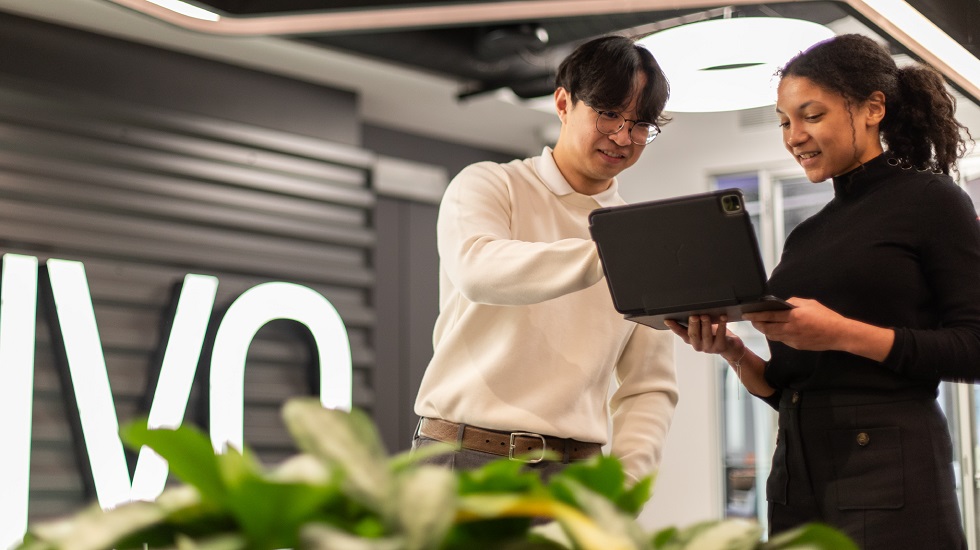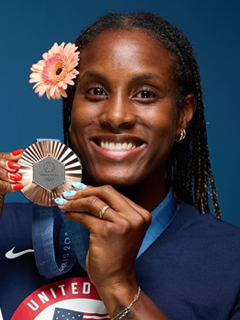Finding the magic: Breaking through to achieve high performing teams
Cultivate a high-performing team by focusing on the essential elements of discipline, organization, and a shared commitment to goals, ultimately creating an accountable and action-oriented group.

"With the score tied and just 1 minute left on the clock, we found ourselves in a do-or-die moment. Australia kicked the ball deep, their defense relentless, driving us deeper into our half. Their defensive pressure and physicality reminded us why they were former gold medalists. But this was our game to claim, and our mindset was unshakable: we believed in our preparation, our adaptability, and our connection as a team.
As one of the Captains of the team, I was usually a starter that was subbed off in the second half. However with this crucial moment Emilie Bydwell, our head coach, called for me to go back in. I know Australia was going to kick off and we had one chance to make history. I connected with my teammates as I ran on, reminding them of the necessary actions we needed to take to secure the win; get and keep possession of the ball, passes to hands, line break, support, and score in the middle.
Australia kicked off and our Interconnections came into play when we caught the ball going backwards. We all created our shape to attack. Our team was built on a foundation of trust and communication so that we could demonstrate connected leadership and execute under pressure with a model of decentralized leadership. As one of the captains, I helped to build our High Women culture of connected leadership and my goal was to transmit belief and encourage everyone to focus on the actions and stay present in the moment.
The final try is often talked about as one of individual brilliance but in reality it was a collective effort. A tough catch going backwards, support to win the ball in contact, quick passes to move to ball to the middle, multiple broken tackles and a determined 90 m run. It was the culmination of months of mental and physical training: adaptability in chaos, unwavering ground rules, and a shared understanding that we were stronger together.
When the whistle blew, we didn’t just win a medal—we demonstrated what happens when mindset and connected leadership come together under pressure."
Naya Tapper
USA Women’s Rugby Bronze Medalist

In the final moments of the bronze medal game at the 2024 Paris Olympics, the USA Women’s Rugby team had to pull together like never before. Australia was pressing hard, and every second felt like an eternity. But instead of panicking, the team leaned on what had brought them this far—trust, adaptability, clear communication, and leadership that rallied everyone to stay focused. In those high-stakes moments, they found their magic, leading them to a historic victory.
It’s not just sports teams that need this kind of mindset, resilience, and teamwork. Businesses today are navigating their own high-pressure environments, where success depends on similar principles. That’s where the magic framework comes in: your key to building high-performing teams in today’s fast-paced world. It helps teams align around shared goals, pivot quickly when things change, create clear processes, foster authentic connections, and empower leaders to inspire innovation. Backed by real-world examples and data, magic equips organizations to tackle complexity, drive collaboration, and deliver breakthrough results.
Magic matters because teams are more complex than ever – and technology isn’t enough

The way we work has changed dramatically. With hybrid setups, digital collaboration tools, and AI transforming our workflows, teams are being pushed to adapt faster than ever. While these changes bring opportunities, they also highlight a hard truth: poor communication and inefficiencies can cost a team more than just time—not only can they drain morale and stunt innovation, they impact the bottom line. That’s why building effective teams isn’t just a nice-to-have; it’s a leadership must.
That’s where the magic framework comes in. It helps bridge the gap between technology and teamwork by recognizing that tech simply amplifies what teams are already doing, and it helps teams cut through the noise by focusing on what really matters - people, collaboration, and results. If a team is disorganized or disconnected, technology will not solve the issue but may accentuate it. But when teams are aligned, adaptable, and communicate clearly, tech becomes a powerful ally to foster high performance and successfully integrate the best talent globally.
“Creating high performing teams comes from intentional leadership and investments – that is why I see so many business teams that are not high performing,” says Pete Steinberg, leadership and executive team expert who was a coach of the USA Women’s Rugby team at the Rio Olympics. “The work that the USA Women’s 7s team to become a great team, and prepare for the moment that changed rugby history, was all done off the grass. They invested time in becoming a great team, and very few business teams do that.”
What Is the magic framework?
The magic framework is a simple yet powerful way to unlock your team’s potential. Standing for Mindset, Adaptability, Ground Rules, Interconnections, and Connected Leadership, magic is built on research and real-world results. It’s not about fancy jargon or rigid processes—it’s about giving your team the clarity and confidence they need to perform at their best, no matter what challenges come their way.
At its core, magic brings together the elements critical to maximizing the talent on your team and creating a foundation for high performance. Magic establishes the leadership, mindset and operating rules of engagement for high performing teams and offers a simple yet powerful recipe for helping teams thrive, no matter the challenge.
1
2
3
4
5

Why magic works
Magic isn’t just theory—it’s being put to work by some of the most innovative and effective teams out there. Take the U.S. Women’s Rugby Sevens team. They didn’t win their Bronze Medal by being the strongest—they did it by trusting each other, adapting under pressure, and staying aligned with a shared purpose. That’s the kind of impact magic creates.
It’s not just for sports teams, either. Pixar thrives on magic principles like shared mindsets and strong interconnections to fuel creativity. Spotify uses adaptable leadership to spark innovation across its teams. These examples prove that when teams invest in alignment, adaptability, and connection, they unlock a level of performance that technology alone can’t deliver.
People are the core of any organization, and effective, high-performing teams—those that achieve more collectively than individually—are crucial in delivering value both within KPMG and to our clients. However, these teams don’t form by chance. They are built intentionally and purposefully. Sharing insights and discussions like these at our Denver Perspectives have been instrumental not only with our own teams, but for our clients and the marketplace.

Brandon Wilcox
Denver Office Managing Partner, KPMG, LLP
Find the magic in your team
The USA Women’s Rugby team didn’t win their medal because they were the fastest or strongest. They won because they trusted each other, adapted when things got tough, and leaned into leadership that brought out their best.
Your organization can do the same. With the magic framework, you can build a team culture that’s ready to handle anything—whether it’s navigating a new challenge or seizing an opportunity for growth.
Bring magic to your team with KPMG Ignition
Imagine stepping outside your regular office space and into a setting designed to help your team focus, connect, and grow. At KPMG Ignition, we offer tools and tailored sessions to help you create the kind of team dynamic that makes challenges feel like opportunities. From pre-work assessments to dynamic workshops, we’re here to guide you every step of the way.
Meet our team



